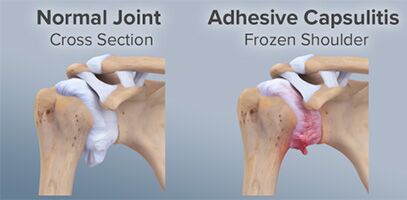- 011 794 9936
- 011 794 9937
- 076 828 5476
- admin@doctorshoulder.co.za
- Room 1, 2nd Floor, Johannesburg Surgical Hospital, 219 Beyers Naudé Dr

Frozen shoulder is a condition that, in the majority of cases has no known cause. It is most common in females (40-50 years) but could affect males and other age groups. It may follow injuries, operations or be associated with medical conditions like diabetes mellitus. It is also known as “adhesive capsulitis” suggesting that the capsule is inflamed and adhering (clinging) to the joint causing pain and a limitation of motion.
Severe pain and restriction of movement. Night pain can be especially troublesome and with sudden movements intense pain may follow, e.g. reaching out to grab something. Reaching the hand up behind the back is usually a problem due to the restriction.
When diagnosed early, we can try and treat it conservatively with Cortisone Injections. Physiotherapy in not used in my practise because my opinion is that the condition is worsened by it.
If the conservative treatment is unsuccessful, an Arthroscopic (Key-hole) surgery is recommended. A capsular release is done.
The operation has a very high success rate but in some cases a Manipulation might be required after 6 to 12 weeks.
The acute healing process is 6 weeks, but the full healing process can take from 6 months up to a year.
Irrespective of the operation, you will have to wear a sling for six weeks and only thereafter should you start with physiotherapy to regain mobility in your shoulder.
For more information or questions, please visit our FAQ page. Alternatively, you can leave a message below, and we will get back to you.

With unwavering commitment to patient care, pioneering research, and surgical excellence have made Doctor Shoulder a prominent figure in the field.
All rights reserved © Copyright Doctor Shoulder
WhatsApp us